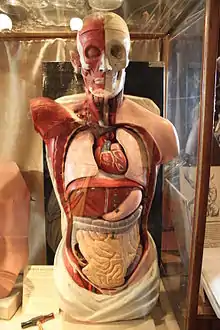
Anatomical model of a human head and torso
An anatomical model is a three-dimensional representation of human or animal anatomy, used for medical and biological education.[1]
Model specs
The model may show the anatomy partially dissected, or have removable parts allowing the student to remove and inspect the modelled body parts. Some models may have changeable genital inserts and other interchangeable parts which permit a unisex model to represent an individual of either sex.
Although 3D computer models of anatomy now exist as an alternative, physical anatomical models still have advantages in providing insight into anatomy.[2]
See also
References
- ↑ Fredieu, John R.; Kerbo, Jennifer; Herron, Mark; Klatte, Ryan; Cooke, Malcolm (2015-06-01). "Anatomical Models: a Digital Revolution". Medical Science Educator. 25 (2): 183–194. doi:10.1007/s40670-015-0115-9. ISSN 2156-8650.
- ↑ Preece, Daniel; Williams, Sarah B.; Lam, Richard; Weller, Renate (July 2013). ""Let's get physical": advantages of a physical model over 3D computer models and textbooks in learning imaging anatomy" (PDF). Anatomical Sciences Education. 6 (4): 216–224. doi:10.1002/ase.1345. ISSN 1935-9780. PMID 23349117. S2CID 2042538.
External links
 Media related to Anatomical models at Wikimedia Commons
Media related to Anatomical models at Wikimedia Commons
This article is issued from Wikipedia. The text is licensed under Creative Commons - Attribution - Sharealike. Additional terms may apply for the media files.